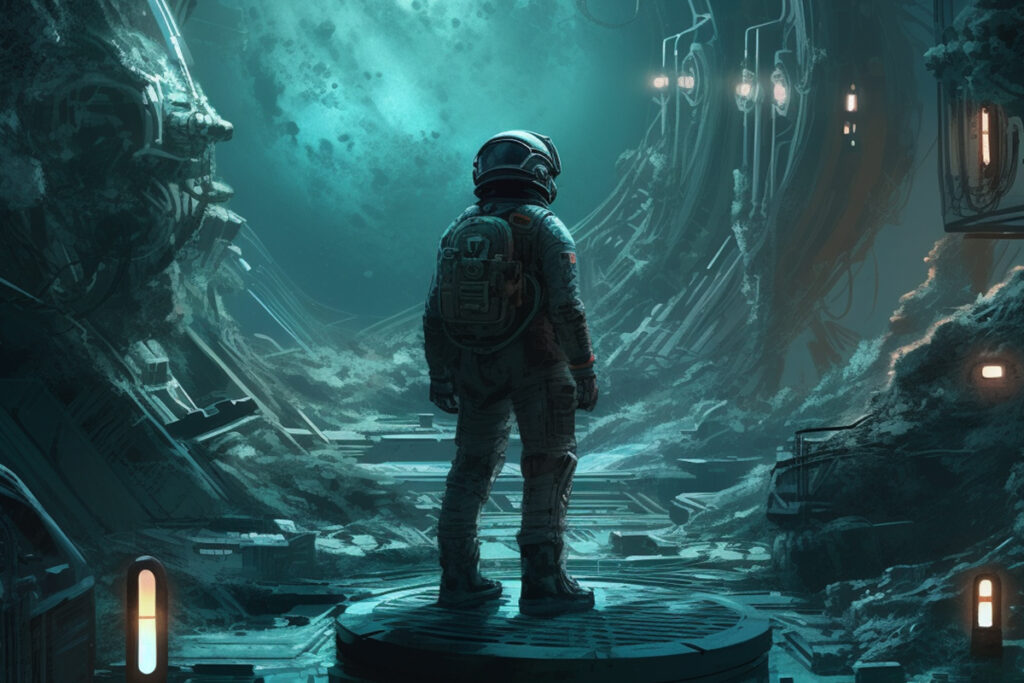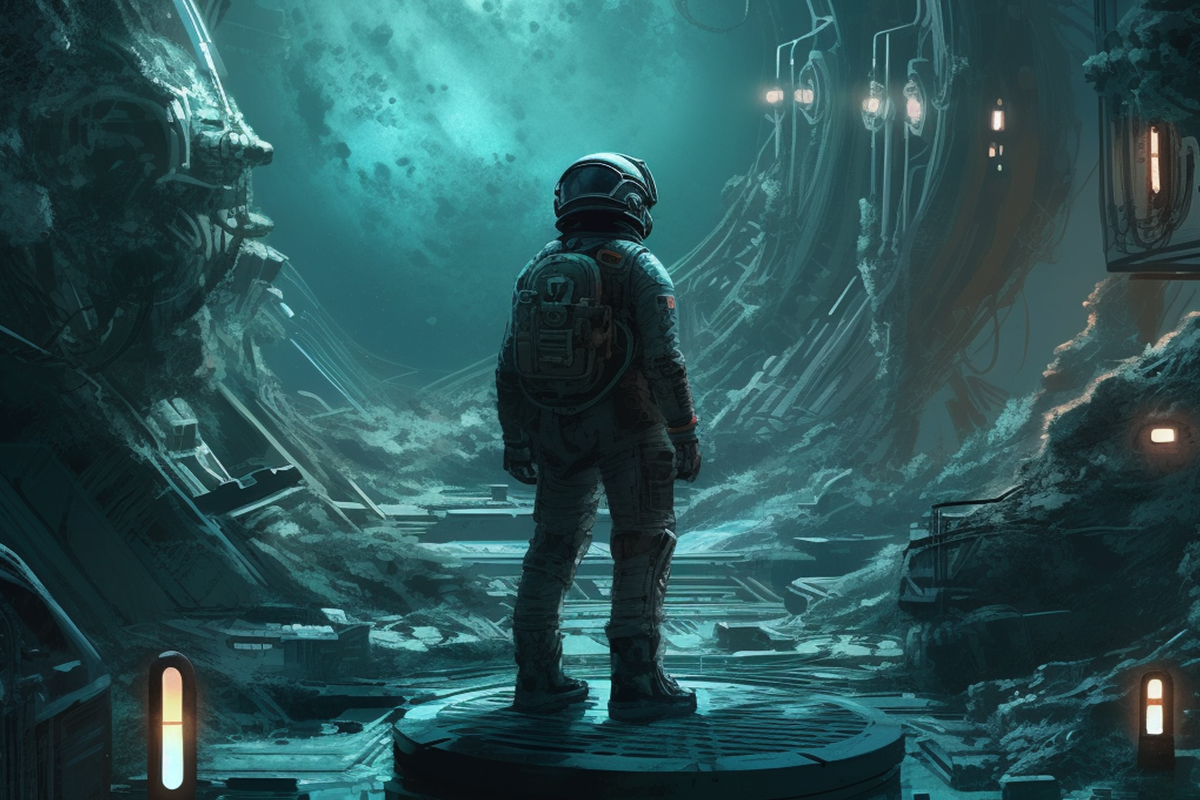Science fiction literature, with its ever-expanding universe of imaginative worlds, has always been a popular genre for readers. Throughout the years, authors have introduced us to countless captivating stories, filled with advanced technology, extraterrestrial lifeforms, and daring adventures. In this article, we’ll explore some of the best sci-fi book series of all time, examining their origins, pioneering authors, and the influential series that have shaped the world of science fiction today.

The Origins of Science Fiction Literature
The history of science fiction literature reaches back to the earliest days of storytelling itself, as humans have always been fascinated by the unknown and the possibility of breaking away from the constraints of their own reality. From the wonders of the heavens to the astonishing inventions of future civilizations, science fiction has evolved over time to encompass a vast spectrum of ideas and themes.
Early Influences and Pioneers
One of the earliest examples of science fiction literature can be found in the ancient Greek classic, “True History” by Lucian of Samosata. The story, written in the 2nd century AD, describes a journey to the moon and a war between lunar inhabitants and Earth’s warriors. Throughout history, numerous authors have dabbled in fantastical realms and enigmatic inventions, such as Leonardo da Vinci’s flying machines or Johannes Kepler’s dream of traveling to the moon.
Another early influence on science fiction literature was Mary Shelley’s “Frankenstein,” published in 1818. While not strictly science fiction in the modern sense of the term, the novel did explore themes of the unknown and the limits of human knowledge, paving the way for future authors to delve deeper into similar themes.
As the 19th century progressed, science fiction literature began to gain popularity, with authors like H.G. Wells and Jules Verne leading the way. Wells’ “The War of the Worlds” and Verne’s “Journey to the Center of the Earth” captivated readers with their imaginative concepts and explorations of the unknown.
The Golden Age of Science Fiction
Regarded as the period when science fiction literature truly flourished, the Golden Age of Science Fiction took place roughly between the 1930s and 1950s. Aided by the popularization of pulp magazines devoted to the genre, such as “Wonder Stories” and “Astounding Stories,” this era introduced a wealth of new authors and inventive concepts. Ray Bradbury, Isaac Asimov, and Arthur C. Clarke were just a few of the authors who rose to prominence during this time, shaping the course of science fiction literature for decades to come.
One of the defining features of the Golden Age of Science Fiction was its focus on hard science and scientific accuracy. Authors like Asimov and Clarke were known for their attention to detail and their ability to weave scientific concepts into their stories in an engaging and accessible way.
However, the Golden Age was not without its controversies. Some critics argued that the genre was too focused on technology and lacked the depth and complexity of literary fiction. Others pointed out the lack of diversity in both the authors and the stories being published.
Despite these criticisms, the Golden Age of Science Fiction remains a pivotal period in the history of the genre, and its influence can still be seen in science fiction literature today.
The Classics: Timeless Sci-Fi Series
Every genre has its hallmark works, and science fiction is no exception. These timeless series are highly regarded by fans and critics alike, often cited as pivotal examples of the genre’s immense potential and creativity.
The Foundation Series by Isaac Asimov
Isaac Asimov’s “Foundation” series has long been lauded as a classic example of science fiction at its best. Comprised of seven novels published between 1951 and 1993, the series explores a sprawling, galactic empire on the brink of collapse. Asimov’s riveting narrative intertwines themes of mathematics, history, and human nature, as the characters strive to build a new civilization capable of weathering the impending dark age.
The series is set in a future where humanity has colonized the galaxy, and the vast empire is ruled by a central government known as the Galactic Empire. Hari Seldon, a mathematician, predicts the collapse of the empire, and creates a plan to shorten the resulting dark age from 30,000 years to just 1,000. The series follows the implementation of this plan, and the challenges faced by the characters as they work to save humanity from a long period of barbarism.
Asimov’s intricate world-building, complex characters, and thought-provoking themes have made “Foundation” a classic of the genre, and a must-read for any science fiction fan.
The Dune Chronicles by Frank Herbert
Another revered sci-fi series is the “Dune Chronicles” by Frank Herbert. Set in the distant future, the story weaves a complex web of politics, ecology, and mysticism, centered around the desert planet Arrakis and the coveted spice Melange. Herbert’s powerful storytelling and intricate world-building abilities have cemented the “Dune Chronicles” as an essential read for any science fiction enthusiast.
The series follows the journey of Paul Atreides, the son of a noble family, as he becomes embroiled in the politics of the empire and the struggle for control of Arrakis. The planet is the only source of the spice Melange, a substance that can extend life and grant psychic powers, making it the most valuable substance in the galaxy. The series explores themes of power, religion, and ecology, and is known for its complex characters and intricate plot.
The “Dune Chronicles” have had a profound impact on the science fiction genre, inspiring countless works and adaptations, including the upcoming film adaptation by Denis Villeneuve.
The Hitchhiker’s Guide to the Galaxy by Douglas Adams
Douglas Adams’ side-splitting “The Hitchhiker’s Guide to the Galaxy” series takes a lighter approach to science fiction, injecting it with ample British wit and absurdity. The adventures of Arthur Dent, an unwitting Earthling, and his alien friends reveal the comedic potential of a genre otherwise known for its gravity. The five-part series, which began as a radio drama, remains a favorite due to its unique blend of humor, satire, and science fiction storytelling.
The series follows the misadventures of Arthur Dent, who is whisked away from Earth just moments before its destruction to make way for a hyperspace bypass. Along with his alien friend Ford Prefect, he travels the galaxy, encountering a host of bizarre characters and situations. The series is known for its irreverent humor, clever wordplay, and satirical take on science fiction tropes.
Despite its comedic tone, “The Hitchhiker’s Guide to the Galaxy” series has had a lasting impact on the genre, inspiring countless works and adaptations, and cementing Adams’ place as one of the greats of science fiction humor.
Space Operas: Epic Adventures in the Cosmos
Few subgenres of science fiction are as beloved as space operas, which are characterized by their grandiose scale, intricate plots, and memorable characters. These epic adventures turn the cosmos into a vast backdrop for countless stories of heroism, drama, and intrigue.
The Culture Series by Iain M. Banks
Iain M. Banks’ “Culture” series offers readers an imaginative, vividly realized universe brimming with advanced technology and morally complex civilizations. Spanning ten novels, the series tells the tales of the Culture, an egalitarian post-scarcity society, and their interactions with various other civilizations throughout the galaxy. The series explores a wide range of themes, including the nature of consciousness, the role of artificial intelligence, and the impact of technology on society. The characters in the series are diverse and compelling, from the Culture’s hyper-intelligent warship, the “Mistake Not…”, to the enigmatic and powerful Minds that oversee the Culture’s operations. Banks’ writing is both thrilling and thought-provoking, making the “Culture” series a must-read for space opera fans.
One of the most memorable aspects of the “Culture” series is its world-building. Banks creates a universe filled with countless civilizations, each with their own unique cultures, technologies, and histories. From the utopian Culture to the warlike Idirans, the series is populated by a rich tapestry of societies that feel fully realized and alive. The series also features stunning descriptions of futuristic technology, from faster-than-light travel to sentient spacecraft. Banks’ vision of the future is both awe-inspiring and terrifying, and it’s impossible not to be swept up in the grandeur of his universe.
The Hyperion Cantos by Dan Simmons
The “Hyperion Cantos” by Dan Simmons is another noteworthy example of a space opera, comprised of four novels published between 1989 and 1997. The series centers on the remote world of Hyperion, on the eve of a devastating interstellar war. The pilgrimage of seven diverse characters to the mysterious Time Tombs serves as the narrative’s anchor, orchestrating a rich, immersive story filled with epic battles, intricate settings, and deeply personal quests.
What sets the “Hyperion Cantos” apart from other space operas is its literary ambition. Simmons weaves together a complex narrative that draws on a wide range of literary and mythological sources, from John Keats’ poetry to the stories of the Canterbury pilgrims. The result is a series that is both intellectually stimulating and emotionally resonant. The characters in the series are vividly drawn and deeply flawed, grappling with issues of mortality, love, and identity in a universe that is both beautiful and terrifying.
The Expanse Series by James S.A. Corey
One of the most recent additions to the space opera pantheon is the “Expanse” series by James S.A. Corey, the pseudonym of authors Daniel Abraham and Ty Franck. This bestselling, nine-book series brings the solar system to life, as humanity grapples with the consequences of their own technological advancements and the discovery of a mysterious, galaxy-altering substance. The “Expanse” series is at once a thrilling adventure and a sharp exploration of human nature in the face of the unknown.
The “Expanse” series is notable for its attention to scientific accuracy. The authors consult with experts in fields such as physics and biology to ensure that the technology and science in the series are plausible and grounded in reality. This attention to detail makes the series feel both authentic and immersive. The characters in the series are also a highlight, from the rough-and-tumble crew of the Rocinante to the political players vying for power in the solar system. The series explores themes such as class conflict, the ethics of scientific experimentation, and the nature of identity in a post-human world.
Overall, the “Expanse” series is a thrilling and thought-provoking addition to the space opera genre. With its complex characters, detailed world-building, and rigorous attention to scientific accuracy, it is a must-read for fans of science fiction.
Dystopian and Post-Apocalyptic Worlds
Science fiction has long served as a platform for authors to explore the darker facets of human nature and society, and dystopian and post-apocalyptic narratives are no exception. These stories are set in harrowing futures where societal collapse, environmental devastation, and moral decline have taken hold.
The Hunger Games Trilogy by Suzanne Collins
The massively popular “Hunger Games” trilogy by Suzanne Collins takes readers into the oppressive, dystopian world of Panem—a society where children are forced to fight to the death in a twisted televised spectacle. As protagonist Katniss Everdeen navigates the brutal landscape and contends with political intrigue, readers are confronted with a chilling reflection of our own culture’s fascination with violence and entertainment.
The Maze Runner Series by James Dashner
Another entry in the realm of dystopian fiction is “The Maze Runner” series by James Dashner. A group of teenagers, their memories wiped clean, must navigate the immense and ever-changing labyrinth that surrounds their isolated community. As their world becomes more perilous and the stakes grow higher, the characters must unravel the sinister motives behind their imprisonment. The “Maze Runner” series merges elements of dystopian fiction, fast-paced action, and gripping suspense to create an immersive reading experience.
The Road by Cormac McCarthy
Considered one of the most powerful post-apocalyptic novels ever written, Cormac McCarthy’s “The Road” is a haunting portrayal of a father and son’s struggle for survival in a world destroyed by a mysterious cataclysm. Bleak in both setting and tone, the novel’s sparse, poetic prose and unflinching portrayal of humanity’s capacity for brutality have earned it numerous awards and a place among the most esteemed works of modern fiction.
Conclusion
In conclusion, the vast and diverse world of science fiction literature presents readers with an inviting landscape of adventure, exploration, and wonder. From the classic series that solidified the genre’s standing to the innovative sagas redefining its boundaries today, these stories continue to captivate and inspire, leaving a lasting impact on generations of readers.
FAQs
What is the definition of sci-fi?
Broadly speaking, sci-fi can be described as fiction that explores imagined, futuristic science and major environmental changes. These changes lead humans to explore space or travel through time to find solutions to the dilemmas that threaten humanity.
Why is sci-fi so popular?
Sci-Fi has always been popular because it is a form of speculative fiction that allows both the author and their reader to question elements of the world, both social and environmental, and to explore the potential solutions to these issues.
There is much debate regarding who is the best sci-fi author. Isaac Asimov is commonly labeled as the father of the genre and the founder of many of the genre’s most popular tropes.
- The 11 Best Books About Cats You Should Read - January 16, 2024
- The 9 Best Books on Building Confidence - January 16, 2024
- Discover the 10 Best Books on the Brain - January 16, 2024



